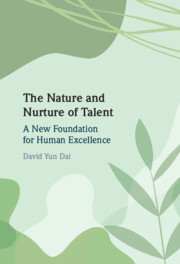Book contents
- The Nature and Nurture of Talent
- The Nature and Nurture of Talent
- Copyright page
- Dedication
- Contents
- Illustrations
- Foreword
- Acknowledgments
- Introduction Rationale, Goals, and Overview of the Book
- Chapter 1 The Evolving Complexity Theory of Talent Development
- Chapter 2 The Question of What Develops
- Chapter 3 The Question of How Talent Develops
- Chapter 4 The Question of When Critical Events Should Take Place
- Chapter 5 The Question of Where
- Chapter 6 How ECT Explains Various Talent Achievements
- Chapter 7 ECT in a Broader Landscape of Theoretic Models
- Chapter 8 Implications of ECT for Talent Identification and Assessment of Developmental Progressions
- Chapter 9 Implications of ECT for Promoting Human Excellence
- Chapter 10 Implications of ECT for Research Methodology
- Epilogue Is AI a Threat to Human Excellence?
- Postscript
- Glossary
- References
- Index
Chapter 3 - The Question of How Talent Develops
Individual Niche-Picking and Cultural Selection as Two Invisible Hands
Published online by Cambridge University Press: aN Invalid Date NaN
- The Nature and Nurture of Talent
- The Nature and Nurture of Talent
- Copyright page
- Dedication
- Contents
- Illustrations
- Foreword
- Acknowledgments
- Introduction Rationale, Goals, and Overview of the Book
- Chapter 1 The Evolving Complexity Theory of Talent Development
- Chapter 2 The Question of What Develops
- Chapter 3 The Question of How Talent Develops
- Chapter 4 The Question of When Critical Events Should Take Place
- Chapter 5 The Question of Where
- Chapter 6 How ECT Explains Various Talent Achievements
- Chapter 7 ECT in a Broader Landscape of Theoretic Models
- Chapter 8 Implications of ECT for Talent Identification and Assessment of Developmental Progressions
- Chapter 9 Implications of ECT for Promoting Human Excellence
- Chapter 10 Implications of ECT for Research Methodology
- Epilogue Is AI a Threat to Human Excellence?
- Postscript
- Glossary
- References
- Index
Summary
Chapter 3 addresses the question of how TD takes place. Two driving forces emerge as individuals move from early spontaneous actions and reactions to environmental opportunities and challenges to more purposive real and projected actions. One driving force emerging in a personal context of surviving-thriving adaptation is individual niche-picking, which influences the direction and strengths of personal strivings, and the other driving force is cultural selection based on cultural norms and distinction, which determines what is culturally worth supporting given its priorities. These two “invisible hands” jointly regulate one’s characteristic adaptation (CA) in the exploratory stage of talent development, and maximal adaptation (MA) in the systematic developmental stage. Both CA and MA are seen by ECT as self-organizing motivational forces for long-term development. CA allows the person to explore their horizon of possibilities and identify a pathway to success that is most rewarding as well as most achievable, and MA allows the person to seek inner and outer resources to maximize their chance of success. Consequently, a developing person has to show patterns of CA and MA conducive to reaching the highest level of self-organization: building a personal enterprise.
Keywords
- Type
- Chapter
- Information
- The Nature and Nurture of TalentA New Foundation for Human Excellence, pp. 62 - 82Publisher: Cambridge University PressPrint publication year: 2024



